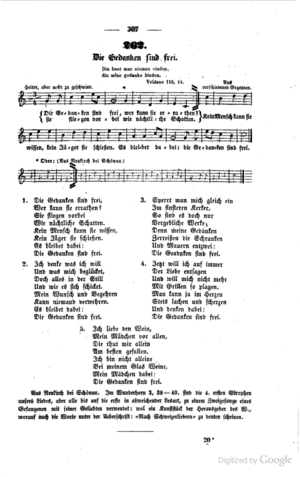Die Gedanken sind frei

"Die Gedanken sind frei" is a German song about the freedom of thought. The text and the melody can be found in Lieder der Brienzer Mädchen (songs of the girls from Brienz), printed in Bern, Switzerland, between 1810 and 1820. The original lyricist and the composer are unknown, though the most popular version "Aus Neukirch bei Schönau" (today Nowy Kościół) was rendered by Hoffmann von Fallersleben in his 1842 collection Schlesische Volkslieder mit Melodien (Silesian folk songs with melodies).
Text
The idea represented in the title—that thoughts are free—was expressed as early as in antiquity[1] and became prominent again in the Middle Ages, when Walther von der Vogelweide (c.1170–1230) wrote: joch sint iedoch gedanke frî ("yet still thoughts are free").[2] In the 12th century, Austrian minnesinger Dietmar von Aist (presumably) had composed the song Gedanke die sint ledic vrî ("only thoughts are free"). About 1229, Freidank wrote: diu bant mac nieman vinden, diu mîne gedanke binden. ("this band may no one twine, that will my thoughts confine").[3]
The text as it first occurred on leaflets about 1780 originally had four strophes, to which a fifth was later added. Today, their order may vary. An early version in the shape of a dialogue between a captive and his beloved can be found under the title "Lied des Verfolgten im Thurm. Nach Schweizerliedern" ("Song of the persecuted in the tower. After Swiss songs") in Achim von Arnim and Clemens Brentano's circa 1805 folk poetry collection Des Knaben Wunderhorn, Vol. III. This version was given a new musical setting by Gustav Mahler in his 1898 Lieder aus "Des Knaben Wunderhorn" for voice and orchestra.
Lyrics
Die Gedanken sind frei, wer kann sie erraten, |
Thoughts are free, who can guess them? |
The rhyme scheme of the lyrics is a – B / a – B / C – C / d – d where capital letters indicate two-syllable feminine rhymes.
Adaptations
Since the days of the Carlsbad Decrees and the Age of Metternich, "Die Gedanken sind frei" was a popular protest song against political repression and censorship, especially among the banned Burschenschaften student fraternities. In the aftermath of the failed 1848 German Revolution the song was proscribed.
The song was important to certain anti-Nazi resistance movements in Germany.[4] In 1942, Sophie Scholl, a member of the White Rose resistance group, played the song on her flute outside the walls of Ulm prison, where her father Robert had been detained for calling the Nazi dictator Adolf Hitler a "scourge of God". Earlier, in 1935, the guards at the Lichtenburg concentration camp had ordered prisoners to stage a performance in celebration of Hitler's 46th birthday; the imprisoned Jewish lawyer Hans Litten recited "Die Gedanken sind frei" in response.[5]
The Limeliters recorded the song in 1962 on their Folk Matinee album. Pete Seeger recorded the song in 1966 on his Dangerous Songs!? album. Norwegian composer Alf Cranner translated and recorded it as "Din tanke er fri" in 1985. Parts of the poem were also taken as the basis of a song by the Brazilian Girls on their self-titled 2005 album.
"Die Gedanken sind frei" was used as the theme and was sung by the Allied prisoners of war in the 1971 TV movie The Birdmen, which was a fictionalized dramatization of an attempt to escape from the German Oflag IV-C camp at Colditz Castle in World War II. It was featured in the 1998 German movie 23 about the hacker Karl Koch. This melody was played by a violinist in the film The Book Thief.
In Canadian author Jean Little's 1972 book From Anna the song is used to represent the freedom the titular character's father craves for his children, and as such figures predominantly into the plot at the beginning of the novel.
"Die Gedanken sind frei" is a track by the German band Megaherz on their Wer Bist Du? album.
Notes
- ↑ Cicero: Liberae sunt (...) nostrae cogitationes, ("Free are our thoughts") Pro Milone, XXIX. 79., 52 BC
- ↑ Der keiser als spileman.
- ↑ Bescheidenheit, 38. Von Erkantnisse.
- ↑ Melon, Ruth Bernadette. Journey to the White Rose in Germany. Dog Ear Publishing, 2007. ISBN 1-59858-249-6. p. 122.
- ↑ Jon Kelly (19 August 2011). "Hans Litten: The man who annoyed Adolf Hitler". BBC News. Retrieved 19 August 2011.
External links
- Variant German lyrics and English translation of same
- "Die Gedanken sind frei", ingeb.org
- Four-part setting for mixed chorus (SATB): Scores at the International Music Score Library Project
- Choral version on YouTube